A Different Kind of Double Hoya: Meet the Class of 2025 Graduates Who Work at Georgetown Law
May 14, 2025
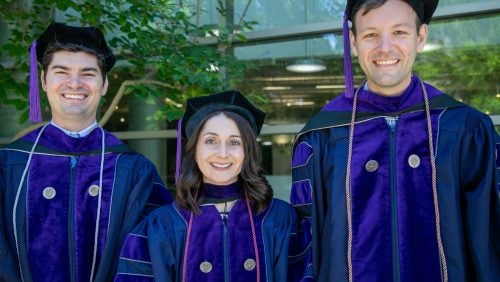
For most people, jury duty is an inconvenience. But for Kelsey Levin-Epstein, L’25, a two-day trial became the catalyst to pursuing a law degree — all while working full-time.
“Seeing the legal system up close was the coolest thing in the world,” says Levin-Epstein of serving as a juror on a 2019 eminent domain case. At the time, she was working in New York City in higher education. “I thought, ‘Maybe I should start thinking about law school.’”
A Class of 2025 graduate, Levin-Epstein is among the some 30 students who enroll each year in the Law Center’s top-ranked evening program, which since the Law Center’s founding in 1870 has allowed participants to hold jobs during regular business hours while earning a J.D.
But Levin-Epstein, who has served in various roles in the Dean’s Office since 2020, is part of an even smaller cohort within the evening program: She and classmates Nick Opinsky, L’25, assistant director of corporate and foundation relations, and Trey Wolf, L’25, former assistant director of stewardship, have worked full-time at Georgetown Law while pursuing their law degrees.
As commencement approaches, the trio emphasizes that the support of their Law Center colleagues and the broader university community has been vital to succeeding as both students and Georgetown Law employees.
Below, Levin-Epstein, Opinsky and Wolf reflect on their paths to law school, the highlights and challenges of balancing their dual roles and the lessons they’ll carry forward in their next chapter as lawyers.
Kelsey Levin-Epstein, L’25, Assistant Director of Dean’s Office Affairs
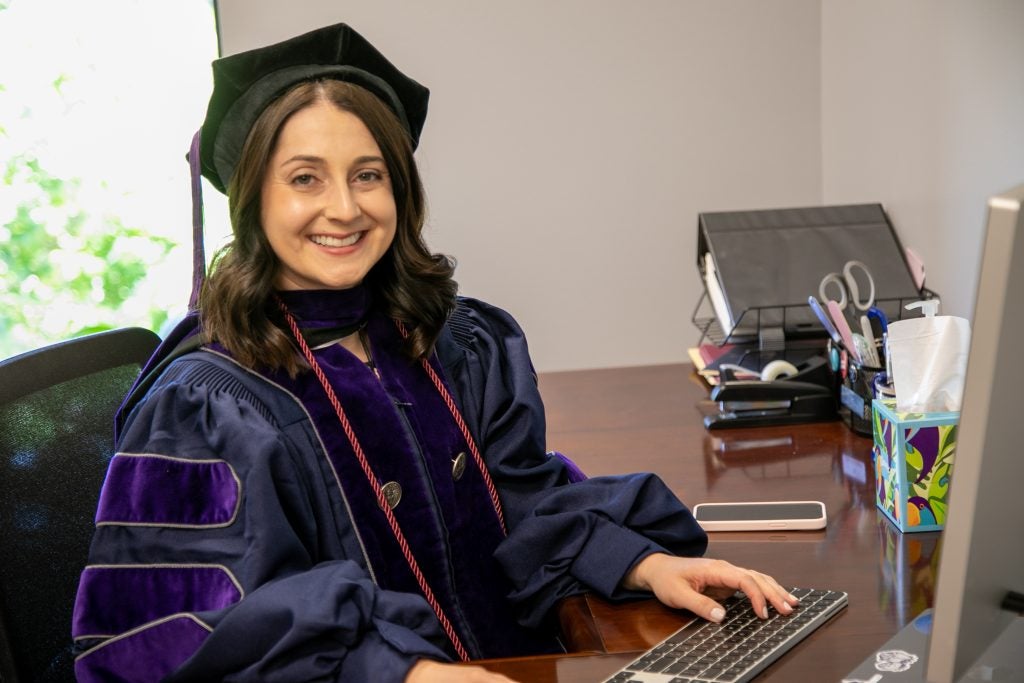
For Kelsey Levin-Epstein, L’25, graduation marks the high point of each academic year. “Every May, we’re reminded that this is what we’re here to do: educate the next generation of lawyers,” she says.
Jury duty may have sparked her interest in the legal field, but Kelsey Levin-Epstein’s connection to Georgetown Law began with her career as a higher education professional.
Having previously worked in the Dean’s Office at the Graduate School of Arts & Science at New York University, where she earned a master’s degree in international education, Levin-Epstein was excited to join the Georgetown Law community as special assistant to Dean William M. Treanor when she and her husband moved to Washington, D.C. in 2020.
Now assistant director of Dean’s Office affairs, a role she has held since 2022, Levin-Epstein works closely with Dean Treanor and her Dean’s Office colleagues in support of both day-to-day operations and long-term policy and planning at the Law Center.
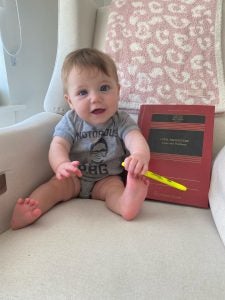
Six months before Levin-Epstein started law school, her daughter Amelia was born.
Levin-Epstein’s law school journey has also been shaped by a personal milestone: motherhood. Her daughter, Amelia, was born six months before her first classes began in 2022. “When I started in August, my civil procedure book weighed more than her,” she recalls.
From the outset, Levin-Epstein knew that she wanted to continue to work while earning her J.D. “I’m a full-time worker, full-time mom and full-time wife,” she says. “The evening program is made for people like me.”
Despite taking an accelerated course load in order to graduate in three years (four is typical for evening students), Levin-Epstein has found time to participate in a range of academic opportunities, including serving as a legal writing mentor through the law fellow program and participating in the Communications and Technology Law Clinic, where she worked on a host of emergent legal issues including the use of artificial intelligence (AI) in policing.
As a student who also works closely with campus leadership, Levin-Epstein acknowledges that she occupies a unique position relative to her classmates, particularly when sensitive topics arise as part of her work. But, for the most part, she says her two roles are distinct — and have served as good practice for upholding the type of confidentiality and professional ethics she’ll follow in legal practice.
Working so closely with Dean Treanor, she adds, has provided special insight into the leadership principles she hopes to embody in her studies and career. “Our motto — law is but the means; justice is the end — informs everything that he does,” she says. “I can take those values instilled in me from working in the Dean’s Office and then practice them in the classroom.”
In October, Levin-Epstein and her family will return to the tri-state area, where she will join the Hogan Lovells New York office as an associate. As graduation approaches, she notes that commencement is not only her favorite campus event of the year as an administrator, but one that she is particularly excited to partake in as a student — especially the chance to walk across the stage during the Law Center Celebration Days with Amelia, now 3.
“Ever since she was really young, we talked about her walking across the stage with me at graduation,” she says. “When she gets older and realizes what I did, I hope it will inspire her to know that anything is possible.”
Nick Opinsky, L’25, Assistant Director, Corporate and Foundation Relations
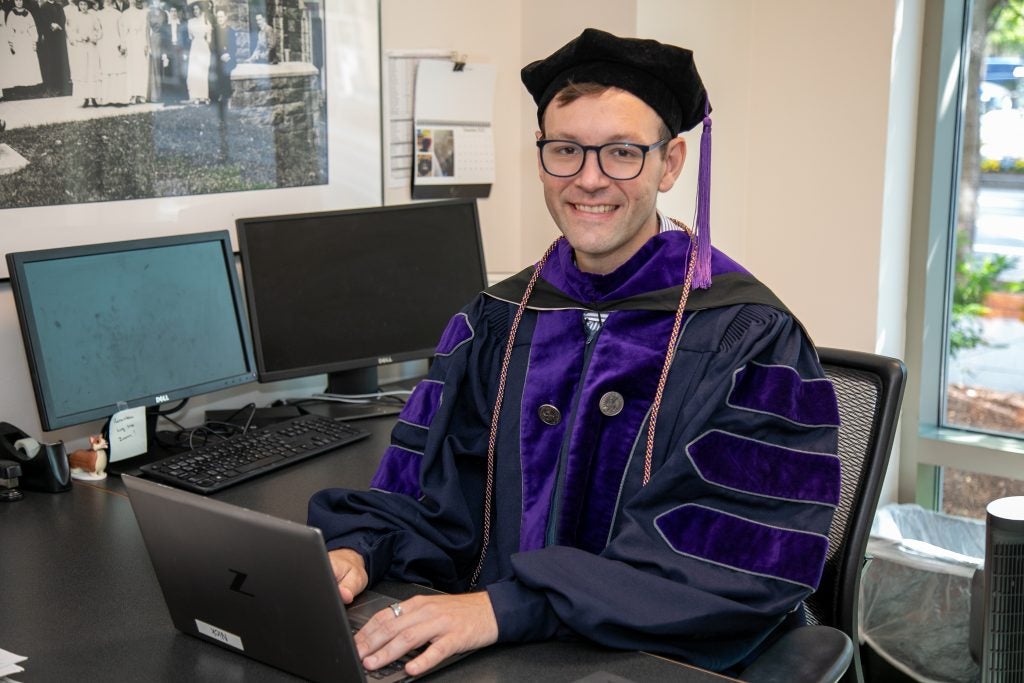
Nick Opinsky, L’25, was drawn to tax law for the insights it provided into his fundraising and philanthropy work. “I’ve always tried to think about tax policy through the lens of human stories,” he says.
As a non-profit fundraising professional, Nick Opinsky, L’25, dedicated his career to philanthropic work, eventually managing a roster of federal grants and supporting grassroots human rights activists as a senior development officer at a New York City nonprofit. But the COVID-19 pandemic proved a tipping point in his professional life.
That’s when Opinsky realized that a law degree, and a background in tax law in particular, could help him better navigate his work in corporate foundation fundraising. Opinsky completed his first year of law school as an evening student at the City University of New York School of Law before transferring to Georgetown Law’s evening program in 2022.
In 2023, he joined the Law Center’s development and external affairs team as assistant director of corporate and foundation relations, helping connect faculty members and the Law Center’s more than 20 centers and institutes with sources of funding to support their work.
“It has been the most amazing experience to contribute to this community through my day job,” Opinsky says. “I get to work with faculty and then take their classes and build deep relationships.”
Those relationships have helped Opinsky develop new approaches to his work, including overseeing lunch-and-learn events for the development team and helping launch fundraising efforts for the RISE program, which serves students who may have had less exposure to the legal profession before law school.
After noticing that not all of his professors were formally affiliated with a center or institute, he recently hosted a presentation to inform faculty of the funding opportunities available to them. “I promised I wouldn’t cold call them,” he says, noting that it felt exhilarating to present to some of his favorite professors in a professional capacity.

Opinsky (right) celebrated a recent birthday with fellow evening and transfer students, including Levin-Epstein (left).
Opinsky has also dedicated much of his time at Georgetown Law to giving back to the transfer and evening student communities, serving as a transfer student peer mentor and president of the Transfer Student Association as well as organizing an annual gathering for evening program alumni and current and admitted evening students.
After graduation, Opinsky will remain in D.C. as an associate at Venable LLP. While he is looking forward to post-graduation life (including more time to devote to the causes that he was involved with before law school) he notes that the transition away from full-time philanthropic work will be bittersweet.
Still, Opinsky plans to remain connected to the Georgetown Law alumni community. Reunion, he says, is one of his favorite events to support each year as a staff member. In the years ahead, he looks forward to attending as an alumnus and maintaining connections with his fellow Section 7 evening program graduates.
“Being an evening student is the best preparation you can have for legal practice and the intensity that comes with it,” Opinsky says. “The perspective and level of camaraderie we have is really special — it creates a cohort for life.”
Trey Wolf, L’25, Former Assistant Director of Stewardship
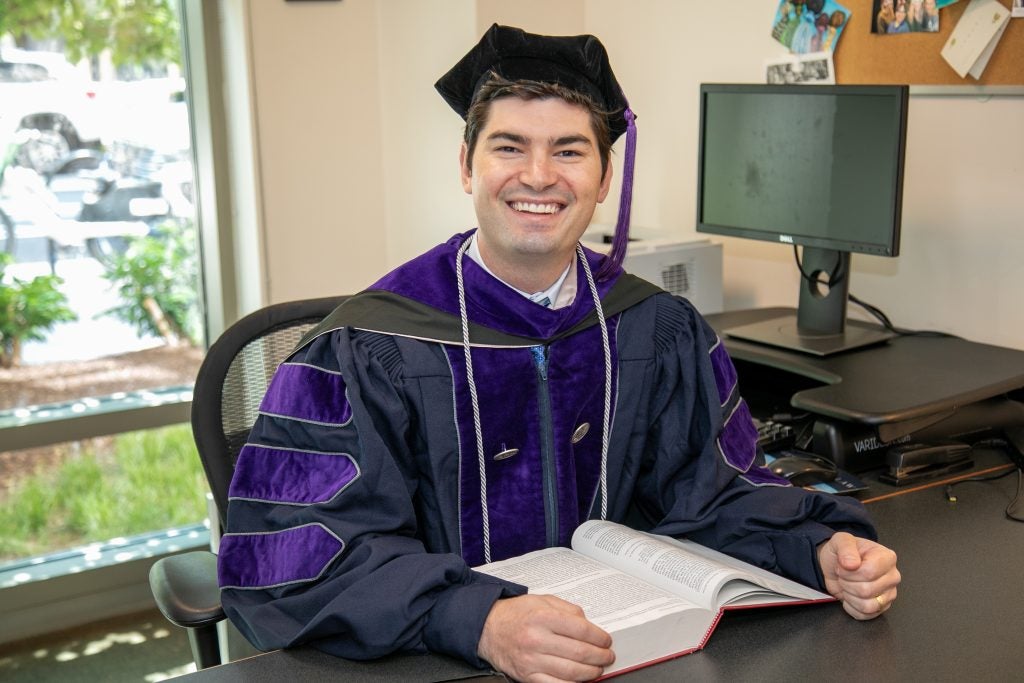
Trey Wolf, L’25, served as special assistant to the Georgetown University president before joining the Law Center’s Development Office in 2021. “It feels really incredible to complete this journey,” he says.
Following a college internship at a civil litigation firm, Trey Wolf initially ruled out a career in law, hoping instead to focus on the renewable energy sector and combating climate change. After graduating from the University of Kansas in 2017, he worked in politics and the nonprofit sector before being hired as special assistant to then-Georgetown University President John J. DeGioia in 2019.
That role, he says, opened his eyes to the breadth and depth of Georgetown’s academic offerings, including the Law Center’s evening program — and made the Oklahoma native reconsider the legal profession.
“I had no idea what was out there for me in the world of renewable energy and the law, but I was sure that Georgetown could help guide my way to it,” he says.
In 2021, shortly after the start of his first semester, Wolf’s tenure as special assistant ended, and he joined Georgetown Law’s development and external affairs team as assistant director of stewardship, responsible for overseeing endowment funds and serving as a bridge between students, clinics and institutes and the donors whose contributions support them.
Although Wolf left his full-time role last October, he remains involved with his former office as a student worker. “Georgetown is family,” he says. “The President’s Office and the [Development] Office have felt like a second home. Not just because I spent so much time there, but because they wanted me to succeed.”
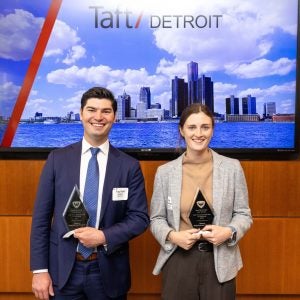
Last year, Wolf (left) and his ADR competition partner Zoe Dettelbach (right), L’24, won first overall place for seller’s counsel at the Wayne State Taft Transactional Law Invitational in Detroit.
Knowing that his free time as a student would be limited, Wolf chose to focus on one extracurricular activity: the Alternate Dispute Resolution (ADR) division of Barristers’ Council, as part of which he has traveled nationwide for competitions and made connections with full-time J.D. students he wouldn’t otherwise cross paths with.
“As an evening student, you’re constantly on the clock,” he says. “ADR gave me the opportunity to feel more integrated into the student experience.”
Wolf also notes that the breadth of courses he was able to take at the Law Center, including classes on utility law, taxation and energy policy, have helped prepare him for legal practice. After graduation, he will remain in D.C. as a finance practice associate on the energy deals team at Foley & Lardner LLP. The role, he says, will allow him to combine his interest in renewable energy with legal practice in a way he didn’t realize was possible before his time at Georgetown Law.
With commencement around the corner, Wolf recalls how, while working in the Office of the President, he would watch graduation ceremonies on Georgetown’s historic Hilltop campus from his office in the Healy Hall bell tower. Now, he looks forward to his turn to celebrate on the green below.
“Georgetown believed in me before I believed fully in myself,” he says. “The university gave me the tools, the resources and the platform to be able to find my calling and my path to make a difference in the world.”